November 4, 2019
In Which a Writer Confesses She Has Thoughts About Desire

Last month, I was at a convention in Ottawa where I had been assigned to a panel to read a “difficult passage” from one of my works.
This was both a simple assignment and absolutely impossible. I know exactly what I find difficult. It is so difficult for me that I have managed to stay ten billion miles away from it in all possible ways.
I don’t find anything difficult but emotions, and I have gone to great lengths to avoid writing them.
It is particularly conspicuous to me that, in five years of pro fiction publishing, I have never published a story with a romance in it. I love romance. I love it so much that I have tens of thousands of pages of it in my archives, meticulously written and rewritten over years, lovingly read back just as often. I have seen my favourite sappy movies literal hundreds of times each. I have lived things that should be the red meat of any writer’s body of work, but I haven’t harvested it.
None of my heroes or heroines have ever fallen in love. They are not in relationships. Nobody kisses and they barely hug; keeping too busy for you to notice. Physical desire is awkwardly absent. I take very wide circles around the topic.
I blush when I think about this hole in my repertoire, this cowardly avoidance. It isn’t as if I am shy. If anything, I am a compulsive over-sharer. I don’t lack for inspiration, or desire to write it. I don’t doubt my skill. I happen to think my romance stories–the ones I keep for myself–are the best I have ever read.
But I am not ready to write romantic feelings for publication, not yet. Instead, I have written a version of the Classical story of Cupid and Psyche that is an effort to contend with why I find the writing of romantic love so fraught. This is ‘The Joy in Wounding’ (F&SF, Nov/Dec 2019).

If you are not familiar with the Cupid & Psyche story, it goes like this:
Psyche is the youngest daughter of a rich merchant, and she is very beautiful. So beautiful that men are continually throwing themselves at her, wasting away for want of her, ruining themselves in droves for a glimpse of her. Venus, the Goddess of Love and Beauty, becomes jealous of Psyche and sends her son, Cupid, to punish Psyche by using his magic to ruin her, probably by having her fall in love with some awful person or another. But, instead, Cupid also falls in love with Psyche, kidnaps her, and carries her away to his hidden palace where he “marries” her and keeps her trapped and alone.
Cupid comes to Psyche every night to demand sex, but he will only do so under cover of dark because he doesn’t want her to know who he is. She becomes convinced she has been kidnapped by a monster of some kind, and frankly, she’s right. Alone all day and raped at night, she becomes despondent. Eventually Cupid allows her to bring her older sisters to visit her, to cheer her up. But they are jealous of Psyche’s beauty and the divine palace she finds herself in, and they convince her she has to slay her monstrous husband and escape.
Psyche takes a lantern and a dagger and creeps up on Cupid while he sleeps, intending to murder him. But instead, she sees how beautiful he is and hesitates. Candle wax drips from her lantern and wakes him, and, angry and betrayed, he casts her out of his home and vanishes.
Well, as if things weren’t enough bullshit up until now, the fallout from Cupid’s tantrum make everything worse. Both Psyche’s sisters try to attract Cupid for themselves, and end up accidentally killing themselves. Psyche feels really really bad about betraying her husband, and spends the next many years wandering the earth, looking for a way to atone. She eventually finds herself working for Venus , the mother-in-law who hates her, and she manages to be such a wonderful and doting daughter that Aphrodite sort of grudgingly forgives her for being pretty and gives her back to Cupid, who has spent this whole time pouting. Hurray, they are reunited, and Psyche is elevated to the status of Goddess. She is the Goddess of the human spirit.
Here’s what galls me about this story: It is generally framed as a romance.
The story of Cupid and Psyche betrays Psyche in so many ways that you could be forgiven for missing half of them. For the crime of being sexually desirable, Psyche is besieged, kidnapped, imprisoned, raped, spited by her sisters, exiled, enslaved, and finally claimed. Her sisters are killed. She wanders the earth for years living as a beggar, looking for a husband who ensorcelled her. And that makes her the essence of the human soul.
I can’t dismiss the hold this story has had over Western culture as anomalous. It reigned as the paragon of love and desire for a solid 1,800 years and I am not convinced it won’t come back en vogue. You can find stories like it in cultures all across time and place. Beautiful women, chosen by powerful men, tolerated only so long as they remained untouched, and punished mercilessly for the desire they inspire in other men.
How romantic.
I am not sure I can publish a story that is soft, comforting and vulnerable when I am still fundamentally so angry.
On one hand, ‘The Joy in Wounding’ was born of that anger, and frustration in how we have remembered Psyche’s story. What I glossed over in my synopsis above, and what most people have never heard, is the second half of the original tale. After wandering the world for years, serving personally multiple goddesses, Psyche ends up in the service of Venus, who is intent on punishing her still. She sets for Psyche a series of impossible tasks, each of them properly Herculean, including collecting black water from the river Styx, facing down dragons, and entering into the underworld. Psyche does it all, and more.
What if we remembered that Psyche? What if her sisters hadn’t leapt to their dooms out of jealousy? What if the villain of the story were the actual cause of Psyche’s misery: the unchecked desires of men?
Yet, I’m not very good at staying angry. I don’t want to inspire anger, I want to illuminate other paths. I wanted ‘Joy in Wounding’ to be about love–just not about male desire. Melantho–sister of Psykhe, and hero of my story–is very much my surrogate for what I am willing to share of my romantic self with the world. There is family and love and maybe something more, but there is no space yet for the rest. We have trust to rebuild. We have foundations to lay. We have to fight to be safe enough for vulnerability and submission. We’re not ready for that yet.
I’m not ready for that yet. Maybe that’s what I have to say about that.
October 16, 2019
Can*Con 2019: Performances, Readings, D&D and more!
Can-Con is the best convention running north of [somewhere far south] right now, I’ll say it. I’ll stand by it, too. The concom’s goal for the last few years has been to build “Readercon North” with an emphasis on professional development for writers. If you’re starting to feel like the panels at your local conventions are a bit too 101, this is where you go for 201, 301, and graduate studies. I love it.
I’m heading up on the train Friday afternoon with half of Toronto, it looks like – are you on Train 42: Nerd Train to Somewhere? Get in touch! We have cookies! Not that I will be hard to find after that. I have a marathon schedule of readings, performances, panels, and more. PLEASE NOTE that I am not an introvert, so don’t take my busy schedule to mean I don’t want to have coffee with you. I love coffee! And people! I would love to see you.
Saturday!

First thing in the morning I will be having breakfast and coffees with folks – if you are a Codex member, check in to the forums! If you aren’t, see above about saying hi anyway.
My one (1) panel is at 1pm: Escaping Ageism in SFF. I am absolutely looking forward to discussion with these incredible people.
My Reading is at 4pm. This is a panel-style event where several writers will be reading “difficult passages” from their work and talking about the process of getting the hard parts down. Hopefully we’ll get some good discussion going and answer some questions about the trickier bits of the craft.
Then, at 6pm — D&D! This live game is counter-programmed against the Auroras, so if you are wondering what to do with yourself while others are at the fancy party, come watch us goof around in *looks at notes* a magical boarding school for adventurers? Anyway, I am super excited about this one.
Sunday!

I have the honour on Sunday of moderating one of Can-Con’s science track panels, this one on the depletion of water resources. One of the amazing things about Can-Con is the number of experts, scientists, policy-makers, and academics they recruit, and this year, they’ve put together a genuinely impressive track for them. I’m going to get up there with my sad little Resource Management BA and guide the brainiacs through an accessible but no doubt weighty conversation on the future of clean water in Canada and abroad.
PodCastle! Live! With Foley! Produced by KT Bryski, this will be a radio-play style performance of a HILARIOUS new work by Derek Kunsken, recorded live for PodCastle. The rest of us are actors in this comedy – I expect this to be a riot. There is a small amount of AUDIENCE PARTICIPATION. I do hope you will come.
Right, I have a panel to plan, some lines to memorize, a character’s props to gather, a reading to choose, and macarons to bake, so with no further ado – see you there!
October 16, 2019
The Satyr of Brandenburg Pt. One Now Up at PodCastle!
Well, I did say it would be up really soon. Three weeks from acceptance to publication – that’s a new record for me! And for a podcast at that!
You can listen to (and read) ‘The Satyr of Brandenburg’, Pt. One now!
And in case you missed it – you can listen to (and read) the first adventure of La Héron and Alex, ‘La Héron’, here as well.
Stay tuned for Part Two!
October 6, 2019
Ending 2019 With a Whoosh-Bam!
Whoosh-bam, that is the official sound of publications dropping, in case you are unfamiliar with it. The whooshing is the mind-blowing speed with which they arrive, and the BAM is the magnificent weight of them landing solidly on, hopefully, your reading list. Six months ago, I had nothing in the pipe. My, how things change.
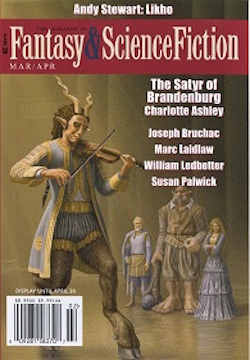
Satyr of Brandenburg at PodCastle!
I’m pleased to announce that ‘The Satyr of Brandenburg‘, the sequel to ‘La Héron‘, will soon appear as a 2-part podcast on PodCastle. It was originally a published in the Mar/April 2018 issue of F&SF (above) but this is your chance to read it online even if listening to audio storytelling isn’t your jam.
I can’t say for sure when it will broadcast, but there’s a rumour that it will be coming up really, really soon. Watch my Twitter feed for details when I get them.
I like to think Satyr stands alone as a story, but La Héron is fun and easy prep, if you haven’t read it yet. Fairies, ogres, treachery and dueling – I got ’em all and more.
The Joy of Wounding out soon at F&SF!
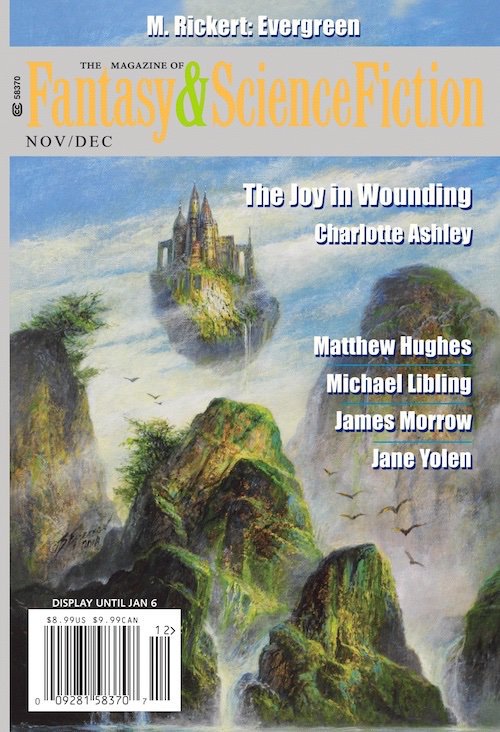
Meanwhile, November 1st marks the drop (BAM) of my latest F&SF story, ‘The Joy in Wounding.’ This is a exploration of the Greek tale ‘Cupid and Psyche’, delving into the time Psykhe (and her sisters Lalange and Melantho) spent wandering the earth after being thrown out of Cupid’s palace.
Needless to say, they become mercenaries. I am nothing if not on-brand.
I’ll post my schedule soon, but I will have copies of both stories with me at Can*Con in Ottawa, Ontario the weekend of October 18th-20th, as well as heaps of my book, Archipelago. I’ll be reading there, though I can’t say what – more on that later.
August 28, 2019
Archipelago, or, How I Became an Accidental Self-Publisher
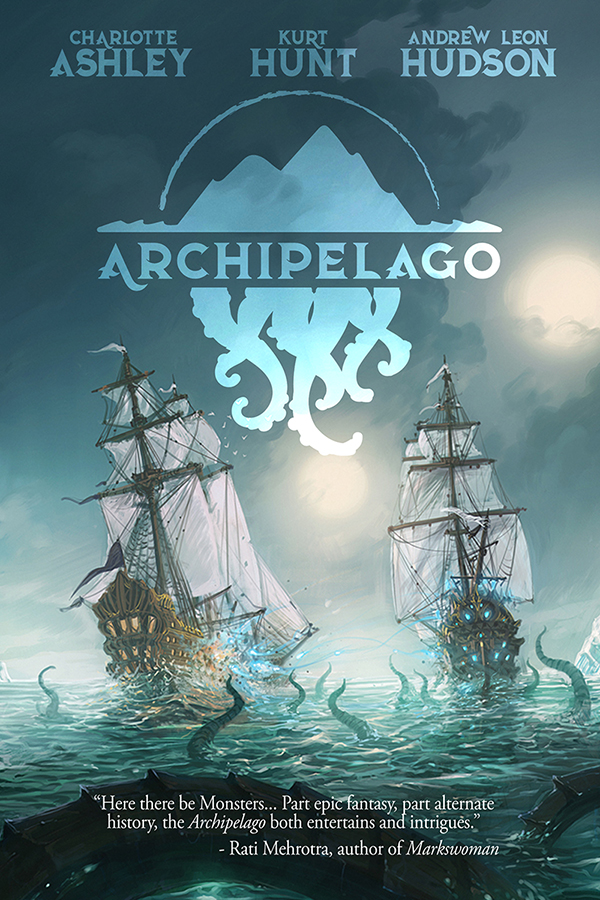
When we launched Archipelago as a Patreon-only project in 2017, we knew we were trying something traditionally nonviable. Patreon was (and is) an iffy lifeline for creators, but Kurt, Andrew and I had creative energy to spare and we wanted to try something new. So, we decided to write a serialized, collaborative, quasi-competitive trio of intertwined novellas. “On the side,” we told ourselves. Just to stretch those writing muscles a bit. (Yah, I know. I see the face you are making.)
The project was, by crowd-funding standards, a success. Not only did all kinds of people subscribe, but the “season” that we wrote was great. In fact, increasingly, my greatest frustration was that this throwaway experiment we had embarked on was better than it had any right to be. I spent a solid year sweating over what would ultimately become quite a long novella with multiple tie-in short stories, and it was paywalled on a difficult platform. I wanted it out.
But Patreon is still “published” and what do you do with three novellas that have already been published?
Archipelago is too good to abandon there. So we did what any self-respecting creative with too much energy does in 2019.5. We took up as indie publishers.
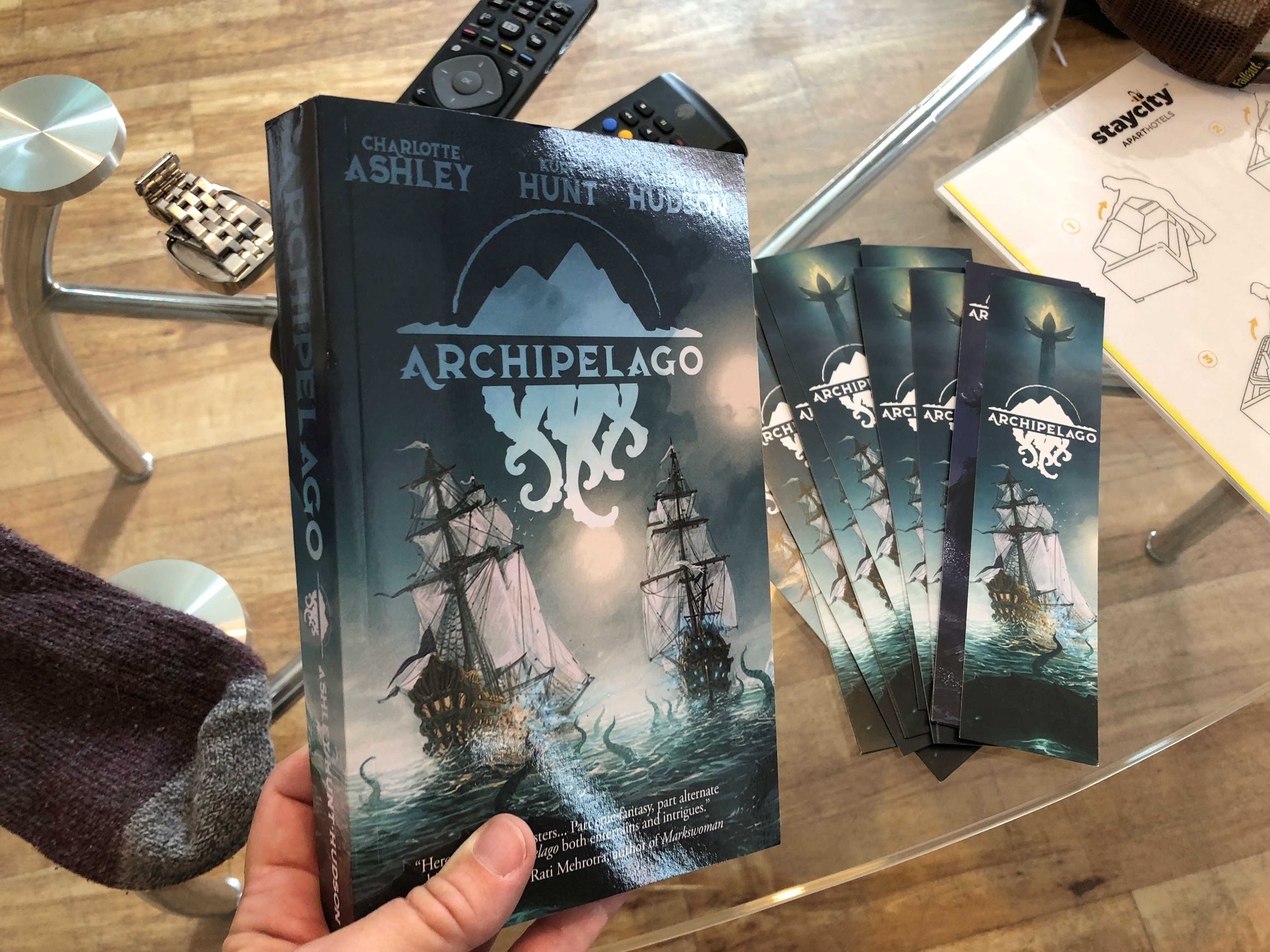
I have not been kind, in the past, about self-publishing.
Being deeply entrenched in the traditional publishing world set me up with a lot of hurdles to accepting self-publishing as a viable career option. I had seen, in the Olden Times, how vanity publishing [didn’t] work, and I could see many of the same pitfalls in new media self-publishing. It makes publishing easy, cheap, and quick, none of which are the hallmarks of quality. Millions of books are published every year, I knew, and reaching an audience is not simply a matter of putting text to screen/paper. Writers, publishers, distributors and booksellers together have to log thousands of hours of work to get a book not just published, but read. Who on earth wants to take that work on alone?!
Well, lots of people. Those of us in the trenches have wisely been calling the practice “indie publishing” for some time now, rather than “self-publishing.” Deciding to go into business as a small press publisher is a hecktonne of work for very little reward, but it is a Noble Cultural Endeavor with credentials ranging back to Gutenberg, so in both senses, that is really more what the current practice is like. Indie publishers are at the center of a huge industry that is keeping an awful lot of us creative types in food & rent: they understand the value of timeless arts such as copyediting, layout design, illustration, and marketing management. They know their craft and pay the bills. And, you know, their books are as good as anything out there.
Yah, I mean, there are still a lot of people out there who think you can bang off a draft, find a cousin who knows their way around Paint, and then upload it to KDP — and I FROWN AT YOU, folks — but this is 2019.5 and I have to finally admit that isn’t what indie publishing is. It hasn’t been for some time.
Well, guess what!
We didn’t want to self publish. Nothing great is created in a vacuum. We did what smart publishers do: we hired the best people we could find to do the best work. From the revisions to the layout to the logo design and cover art, we went over every stage of the publishing process with meticulous care and spared no expense getting the book we wanted in the end. This isn’t a vanity project. We are publishers, and we are professionals. Archipelago is something we wanted to be proud of.
And I am.
We launched the ebook in time for a Dublin WorldCon sale, but if you missed that, we’ve got something even better now. Today, the paperback goes on sale. With every paperback purchase you get the ebook free. Personally, I think the paperback is a thing of beauty but if you are into reading on your pad instead, then WHY NOT BOTH?
Naturally, I’d be thrilled if you bought the book. I would be even more thrilled if you wanted to review the book, on Amazon, Goodreads, your blog or elsewhere. And reach out if you want to talk! I’m eternally available for interviews and guest posts.
I never thought I would self publish. But then, I hadn’t imagined the Archipelago either. Now, I am grateful for both.
June 5, 2018
She Falls
 This piece, you know, was originally called “She Lives.” She, the heroine, is not fallen in any of the senses we’re used to, though she enjoys falling in the literal sense. She just is, and she enjoys it. She lives. She has forgotten a lot, but She has learned, instead, that falling is nothing but a high-speed relocation from one state to another, an exhilarating and unpredictable process of adrenaline-pumping change. Falling is fun. So, She Falls.
This piece, you know, was originally called “She Lives.” She, the heroine, is not fallen in any of the senses we’re used to, though she enjoys falling in the literal sense. She just is, and she enjoys it. She lives. She has forgotten a lot, but She has learned, instead, that falling is nothing but a high-speed relocation from one state to another, an exhilarating and unpredictable process of adrenaline-pumping change. Falling is fun. So, She Falls.
I’ve been calling “She Falls” my “cathartic break up story.” I wrote it about six months into a breakup that would take, ultimately, two years to formalize. I wasn’t heartbroken or lonely, but I was deeply irritated that this thing I had spent so much time building, this thing which was supposed to be my life, the basis on which I build the rest of my life, turned out to be fatally flawed. I’d been just merrily trotting along, living, enjoying myself, failing to notice that this lode-bearing part of the structure was broken. When it cracked and the whole structure was compromised, I really had no one to blame but myself. And there was nothing to do but tear it down and rebuild.
“She Falls” is about that obliviousness, change, tearing it down, and rebuilding. It’s personal, but I hope you’ll get to read it. On top of the rest, it’s funny, too.
“She Falls” has been promised to Upper Rubber Boot‘s next Women Up to No Good anthology, Broad Knowledge. You can read an excerpt of it at the Kickstarter today. It starts out with a bang. I hope you’ll have a look, and kick us some support! Both books should be AMAZING. Just look at those TOCs. Honestly.
If you want an even bigger taste, check out the video below! I read the first 5 minutes or so of “She Falls” at the Tartan Turban Secret Reading Series back in February, and it was a hit! You can see me starting at about 42:38.
As always, if you want to support me and my work, feel free to buy me a coffee (read: beer) at Ko-fi! Cheers!
April 3, 2018
New Story @ Kaleidotrope!
We all have stories that are hard to sell. It’s not that they aren’t good, it’s that they don’t fit well into boxes. Is it science fiction? Fantasy? Historical? Urban? Will American audiences understand it, and is it appropriate for The Youths? You know what I’m talking about. The easiest stories to sell are the boring ones. The fun stuff? God help you.
‘Gog and Magog’ is one of the first short stories I ever wrote, back when I was a firecracker of pure, unrefined genius (or so I thought) and could write 2000 words a day in between research sessions. I had been reading The Alexiad, a chronicle written by Princess Anna Komnene around 1150, and was falling down rabbit hole after rabbit hole learning about the incredibly awesome women of the 12th century Byzantine world. Queen Tamar of Georgia! Melisende, Queen of Jerusalem! I mean, come on, Eleanor of Aquitaine!
I knew I wanted to make something of Queen Tamar’s badass daughter-in-law, unnamed by history. All we know about her was that she was a commoner and the priests hated her, but the king, George IV, was completely under her spell and married her anyway. This wasn’t a case of misogyny: after all, George succeeded his mother, and when he died prematurely at the age of 31, his sister, Rusudan took the throne. No, George’s wife was just a pain in the butt, someone who spat in the face of convention of authority. Whoever she was.
The first draft of ‘Gog and Magog’ was written almost entirely without punctuation, in the train-of-thought style of someone telling a story aloud. I wanted to capture that vernacular, archaic and oral, and have some fun with it. Well, you can guess how that went with editors. “There are spelling and grammar mistakes throughout….” I dialed it back a bit and started adding a caveat to my cover letters, but it was a tough sell. People don’t like unconventional styles, and the writer is not always there to say “Hey, guys, just relax and let it happen. Just read. It’s okay, I swear.” The readers will do what the reader will do.
But I wanted that voice. Maybe not the flatly incoherent one of the first draft – but reminiscent of a chronicle’s cadence and oral feel. Eventually, I trunked the story because I wasn’t willing to rewrite it conventionally. I might be a shill, but I have my pet projects. I loved that ridiculous first draft. I wasn’t giving it up entirely.
I shined it up for Kaleidotrope. If anyone would “get it,” it would be Fred Coppersmith. He has always taken chances on the weird stuff, and every issue is a well-curated set of matching weirds with spectacular art and presentation. An offer from Kaleidotrope is the kind of compliment that means something specific. I genuinely love being one of his authors.
So I am very pleased to say that my beloved ‘Gog and Magog’ is now up in the Spring 2018 issue of Kaleidotrope!
Drop me a line and let me know what you think! And as always, your support via coffee (e.g. booze) is always appreciated. 😀
March 19, 2018
ChiSeries this Wednesday!
Okay, Toronto! Hope you’re up for something fun this Wednesday, ‘cuz fun is what I’m up to!
This Wednesday, March 21st I will be reading at the monthly ChiSeries T.O. along with Rati Mehrotra, V.S. McGrath, and special-music-guest Kari Maaren! We’ll be at The Round in Kensington Market (152a Augusta Avenue) from 8pm-11pm. In addition to awesome readings and drinks, Bakka Phoenix Books will be there selling books – including much-sought-after PAPER COPIES of present and past issues of F&SF!
Do come out, and as always, don’t be a stranger. I’m always down to hang out with new people! 😀
March 1, 2018
Meet ‘The Satyr of Brandenburg’
It’s publication day!
My latest novelette, “The Satyr of Brandenburg,” is finally available for purchase! I sold this story back in April of 2017 after a harrowing revise & resubmit process (any writer will tell you that ALL revise and resubmit processes are harrowing; this was nothing worse.) I found out in September ’17 that my story would be the cover story, but it was not until last week that I finally saw the art!
This is my second story featuring the otherworldly duelist, La Héron, and I have by now a very clear idea of exactly what she looks like, how she smirks, how she stand when she’s ill at ease or laughing or drunk. Seeing her realized by an artist was a bit of a shock. She’s not what I imagined. But that’s the thing about story: it’s about what you imagine, not me. I am only here to guide the reader. This is someone’s La Héron.
Anyway, you can pick up the issue digitally or physically at:
Amazon
Amazon UK
Weightless Books
Direct from F&SF
In Toronto, you can get copies at Presse Internationale!
If you missed the first adventure of La Héron, catching up is easy – It is published & available as a podcast at PodCastle!
Like what you read here? Buy me a coffee!

November 21, 2017
A Short Note About Book Distribution
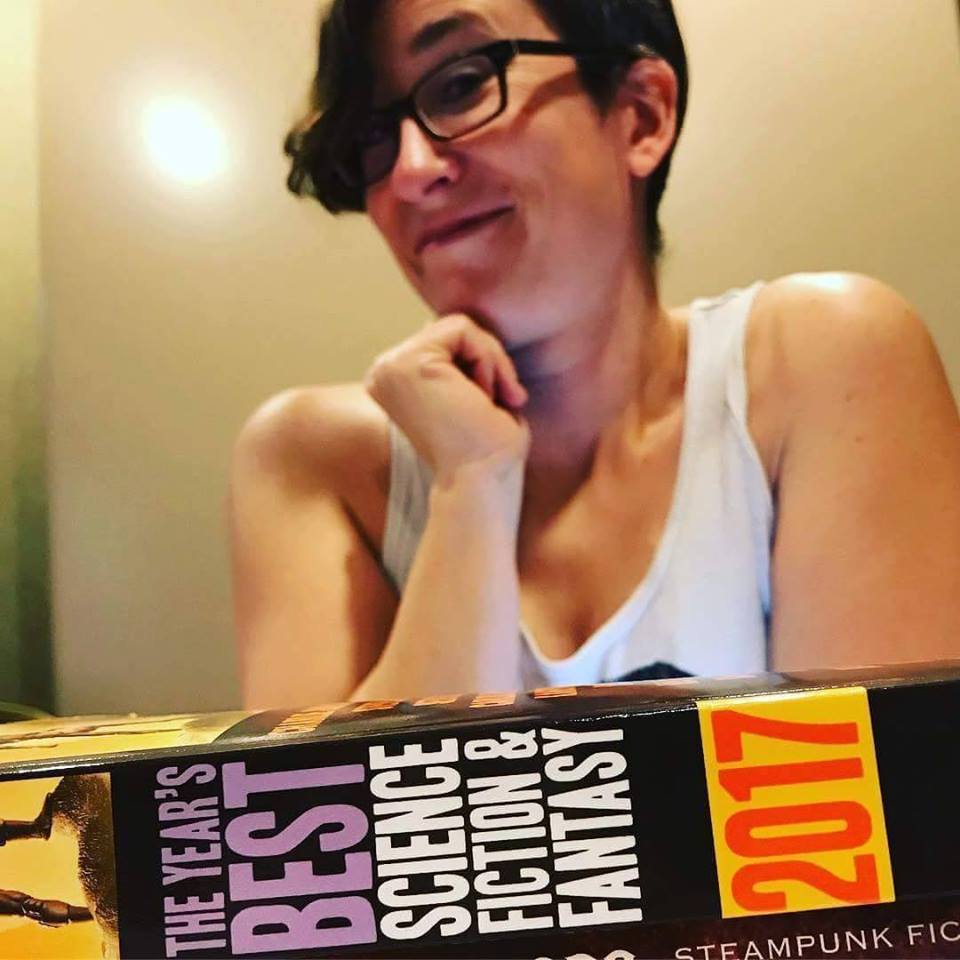 Good news first! The Year’s Best Science Fiction & Fantasy 2017 ed. Rich Horton (Prime Books 2017) is out, and I am in it! My contribution is “A Fine Balance,” originally published in the Nov/Dec 2016 issue of F&SF. I’m over the moon at being included!
Good news first! The Year’s Best Science Fiction & Fantasy 2017 ed. Rich Horton (Prime Books 2017) is out, and I am in it! My contribution is “A Fine Balance,” originally published in the Nov/Dec 2016 issue of F&SF. I’m over the moon at being included!
I… only wish it had been easier to actually get the book.
I work in a bookstore. I can, and do, order anything I like for myself, even under terms and conditions that we might not daily agree to. But this has been the second time this year that a book I appear in has been difficult, if not impossible, for me to bring in.
Last month, I spoke with a number of other writer/booksellers at a panel at Can*Con in Ottawa about how writers can interact with bookstores. Ultimately, it turned into an hour-long lesson on the supply chain, because writers don’t fully understand that getting published does not necessarily mean showing up in stores. Over the month since the con, I have come to realize even publishers do not understand how bookstores order and why they can’t get into stores.
So, I offer this to you: a quick breakdown, highlighting especially how the chain has changed in recent years to cut out smaller booksellers. I’ll borrow a thing or two mentioned by my fellow booksellers, Leah Bobet, Aura Beth Roy, and ‘Nathan Burgoine.
You write a manuscript.
![]()
A publisher (this might be you) turns it into a book.
![]()
The publisher places the book with a distributor.
![]()
The distributor sells the book to stores.
In addition, the distributor takes returns from bookstores, then can sell those books to other stores. The distributor also (often) will warehouse the book for a certain amount of time.
Bookstores like to deal with distributors, not publishers. This is because of the returns clause: most bookstores have the right to return usually 10-15% of their purchases to the distributor. The distributor gives the bookstore a credit when the books are received, and that credit can be spent on other books from that distributor. This means you might return a book from one publisher and spend the credit on a book from another publisher.
This is a credit worth having. It’s flexible. Dealing with each publisher individually would not only be a logistical nightmare, but it means your return credits would be of very limited use. What if that publisher only has one or two books? Nope. Consolidating through a distributor encourages bookstores to take risks on books and buy things from micropresses, because they aren’t trapped in a relationship with that one book.
From the publisher perspective, having a distributor allows them to mitigate the loss from returns, because those books stay in the distributor’s system longer, and can be re-sold to other stores. It allows them to get into bookstores all over the country/world, using that distributor’s infrastructure. It saves enormously on administrative nonsense. It opens the door into thousands of bookstores.
I understand publishers take a hit from this chain in two ways: one, the distributor takes a cut. They just do. That’s their price. Two, the distributor almost always allows returns from bookstores and thus, books will be returned, ultimately, to the publisher.
Nobody likes returns, but they are a fact of life in almost all retail. Every year, millions of new books are published. The bookstore buys them for roughly 40% off of cover price – meaning for every 2 new books we want to buy, we need to have sold 3 other books at full price. For every 2 books you see on the shelf, 3 other books had to be sold to pay for them. To say nothing of rent, labour, and operating costs. That’s a HUGE volume, and it never happens. If we had to wait to sell three book in order to buy two more, we would literally never buy new books. We’d just be sitting around waiting to move old, outdated stock.
Returns help. You send back last year’s fashions to make room for this year’s. Thus, the world goes around.
Some distributors have found a way to attract the business of nervous small publishers by offering that holy grail: NO RETURNS. Diamond Distribution, who specialize mainly in comic books, are the biggest of these. This is who distributes for Prime Books – the publishers of my Year’s Best.
 How do they do this? Well, they put the burden on the bookseller. In order to be allowed to order from Diamond, the bookseller needs to buy a minimum number of their books – which, again, are mostly comics and small presses. This minimum order gives you the right to a very limited discount (less than 40%) and no returns. If you want to be able to return books, your minimum order needs to be even higher. Returns only apply to new books – not backlist – and they need to be sent back quickly. They don’t have any shelf life.
How do they do this? Well, they put the burden on the bookseller. In order to be allowed to order from Diamond, the bookseller needs to buy a minimum number of their books – which, again, are mostly comics and small presses. This minimum order gives you the right to a very limited discount (less than 40%) and no returns. If you want to be able to return books, your minimum order needs to be even higher. Returns only apply to new books – not backlist – and they need to be sent back quickly. They don’t have any shelf life.
This is a model built for comic distribution, where new issues come and go monthly. For books – and graphic novels – it is totally non-functional. For this reason, most big comic book publishers have left Diamond and gone to more conventional distributors.
These days, I only find myself face to face with Diamond if I am dealing with a small press. These guys are usually just inexperienced. They were burned once by a high return, and they are determined it will never happen again, so they go with the big name that won’t give their books back.
But their books will never reach bookstores. Very, very few independents can afford to open an account with Diamond, much less a big enough account to get the terms they need. Diamond is a graveyard for small presses.
This brings us to Ingram. Ingram is the Amazon of distributors: a huge, sprawling mess of every book ever, with no customer service and very rigid terms. Almost everyone lists with Ingram because they might as well. Ingram will allow you to list your books as non-returnable, if you need to. They means, of course, they won’t warehouse them, and they may not offer the bookstores a discount. The bookstore can technically get the book, but they aren’t encouraged to. Aside from lack of returns and bad discounts, Ingram doesn’t offer any useful cataloguing service, they have no customer service, and their shipping fees suck.
I did, after all, order my Year’s Bests from Ingram. They were printed on demand and are, thus, miscut. There was no discount, and they were shipped to Canada at a great cost to us. Even at my “wholesale” cost, they cost me 50% more than cover price.
I was going to put them on the shelf and sell them, but I can’t. Not looking like that. Not at those rates.
So, what does a writer or publisher do, if they want their books easily available in bookstores?
Writers, ask prospective publishers who they distribute their books through. If the answer is “direct,” run. You might as well print your own book.
If they only distribute through Diamond or Ingram, know that this means your books will not show up in indies. They may not even show up at your local B&N or Chapters.
There are lots of good, reputable distributors in both Canada and the US. There are the big guys, of course: the distribution arms of Simon & Schuster, Penguin Random House, Hachette Book Group. I give Perseus distribution a tentative thumbs up, though they have recently been bought up by Ingram and have become very difficult to deal with, even though they operate separately from Ingram.
There are also excellent small press distributors who understand very well the challenges small presses face. Independent Press Group (IPG) and National Book Network do great work. In Canada, we have Literary Press Group (LPG), LitDistCo, Raincoast Books, Brunswick Books, and UTP Book Distribution. There are more, many distributing in particular types of books (university presses, scholarly publishing, children’s books, etc.) Do some research. Ask your local bookseller what they think of your choices.
Publishers, one last thing about returns.
Returns suck. I get it. Especially if the book store chain you are working with doesn’t even give the books back – some will just pulp the books and then bill you for them. But there are ways you can work this into your contracts or publishing model.
DON’T REPRINT RIGHT AWAY. Initial sales are ALWAYS inflated. Wait until the three month mark, when returns start coming back. Obviously, use your professional judgement: if your book was Tweeted out by Obama or up for a major award, REPRINT FOR SURE. But if Indigo just happens to be using it as a doorstop in all its stores, maybe wait. Give it a minute.
ASK FOR YOUR BOOKS BACK. Pulping is not in any way the industry standard. Your distributor can ensure that your books come back to you in salable condition. Take these on book tours with you.
OFFER FLEXIBLE DISCOUNTS. This is especially applicable if your distributor works with a discounter for overstock books. Got lots leftover? High returns? Offer them out for a bigger discount. Sell ’em to a discounter in bulk. The book chain is many-faceted, and your business plan has to account for the different stages of a book’s life. You might lose money at some of these discounts, but that is made up for with the better sales you get on front list by being out there with books easily available.
*
Now, it’s possible that this is indicative of a seismic shift in the industry. Diamond and Ingram are perfectly sufficient for dealing with Amazon. If most of your sales are through Amazon, then maybe it’s worth cutting out booksellers in order to get risk-free distribution.
I think this is narrow thinking. Booksellers are your army. They are your boots on the ground. Even if readers increasingly buy their books online, they still visit bookstores to browse, to talk to the staff. They want to see what’s out there, connect with people who love what they do. A bookseller is worth a ZILLION Amazon algorithms. Worth at least ten book bloggers, in my humble opinion, because we are steeped in this stuff. You want us to champion your books. You want us to put it in the hands of your readers.
Open floor, here. Any questions? I’m happy to field any technical book chain or publishing questions here. Pick my brain. That’s what booksellers are for. If you appreciate this post (and others like it,) click below to tip!




